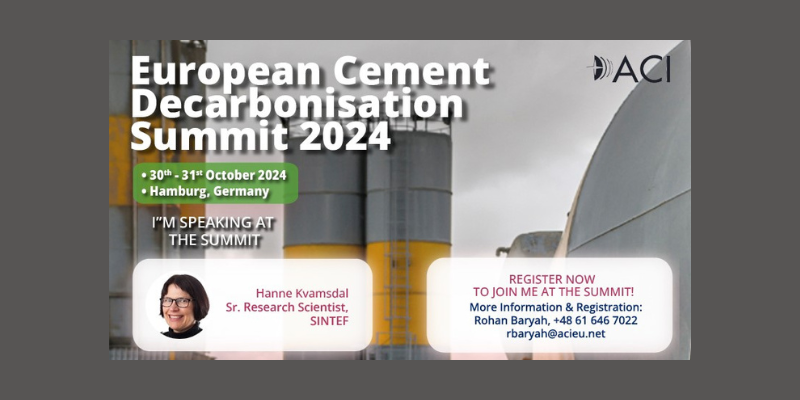The AURORA project is pleased to dedicate this article to our female researchers to promote their work and careers around the decarbonisation of CO2-intensive industries such as refining, cement, and materials recycling, as sectors where other alternatives towards climate neutrality do not exist yet.
As part of the AURORA project, we interviewed Ms Hanne Kvamsdal, Senior Research Scientist for SINTEF industry.
Career and challenges
Q.: Ms Hanne Kvamsdal, can you tell us about your journey to becoming a researcher, the challenges you encountered along the way and the most important lesson you learned?
Ms Hanne Kvamsdal: I have been working as a researcher almost all my entire career except for some years in the industry after my master’s in chemical engineering. Though an important experience for me, I wanted more challenging tasks in my work-life and started a PhD study within gas separation. My background has been very useful in my work as a researcher in SINTEF for more than 25 years of which almost all of them related to developing and further improving CO2 capture technologies. Though there are many women with Chemical Engineering background and also increasing interests from women within various CCUS topics, the majority involved is still men. Though superior in many respects expert-wise I still feel that I have to work harder, be more convincing, and repeat messages more than my male colleagues and other men within the CCUS community. Nevertheless, as a researcher in SINTEF I am able to choose the topic of my own research as long as I ensure proper funding. Inspired by this opportunity, I have initiated and developed several projects, of which AURORA is the latest.
Role in the project
Q.: What do you do within the AURORA project? How have your studies and expertise enabled you to fulfil this role?
Ms Hanne Kvamsdal: I am the project coordinator of the AURORA project, but I am also leading and involved in many of the tasks in the projects. As one of the main initiators, I was able to include many of my own research interests in the project. I think one of the reasons that this project initiative was awarded funding from the Horizon Europe programme, is my experience from working in many EU funded projects as well as developing interesting and relevant projects addressing the requirements of the particular call text.
Europe
Q.: At European level, do you think the research sector has become more open to women? What could be done to achieve greater equality between men and women in this field?
Ms Hanne Kvamsdal: It has improved over the years since I started my research career, but still technology oriented research is dominating by men. I think that the results of the various projects will be better if there is a gender balance and as such it is important to establish balanced research teams. For example, in AURORA we are four out of seven female Work-package leaders and I have included most of my female colleagues in the project team.
As an expert in gas separation, what do you see as Europe’s biggest challenge in decarbonizing CO2-intensive industries?
Ms Hanne Kvamsdal: The biggest challenge is the costs associated with CO2 emission mitigation and the political reluctance to encourage and support various initiatives. Just increasing the CO2-tax may end in carbon leakage, which will not solve the challenge globally. The politicians should think in longer perspectives as if we are not doing anything now, the cost will be much higher in the future when we have to pay for the effect of the climate change.
Q.: Finally, what advice would you give to future generations of women who want to become researchers?
“Being a researcher is a great opportunity for women (and men) to have a real impact on future societies. Examples are various technological solutions, proper use of AI, recycling of materials, and city planning.”
Hanne Kvamsdal
Read interviews with other researchers:
GHGT-17 – Greenhouse Gas Control Technologies conference conference in Calgary, Canada | October, 20-24
From 20th-24th October 2024, the AURORA project partners will take part in the 17th International Conference on Greenhouse Gas Control…
Join us at the European Cement Decarbonisation Summit 2024 | Oct. 30th – 31st in Hamburg (Germany)
We are excited to announce that the AURORA project, coordinated by SINTEF, will be prominently featured at the upcoming European…




